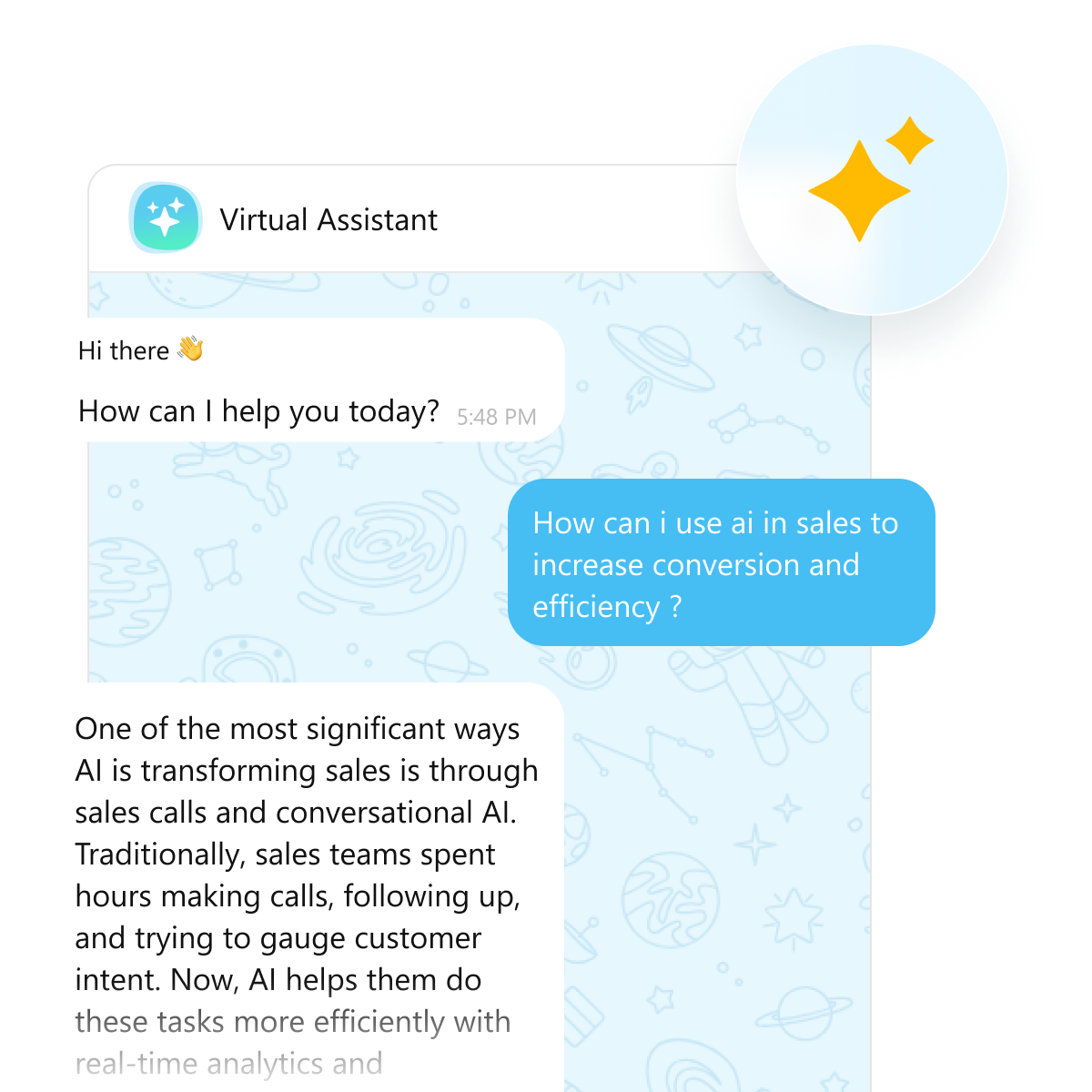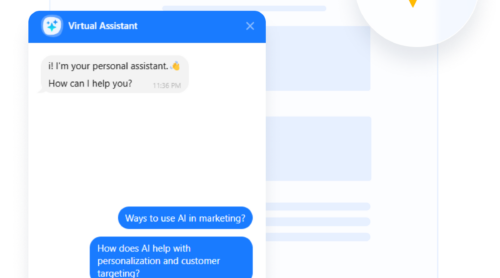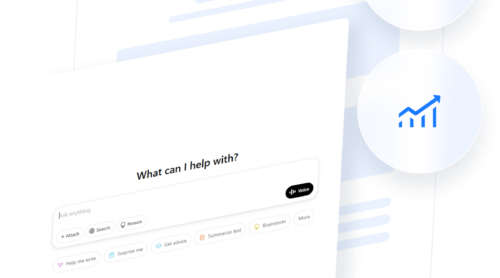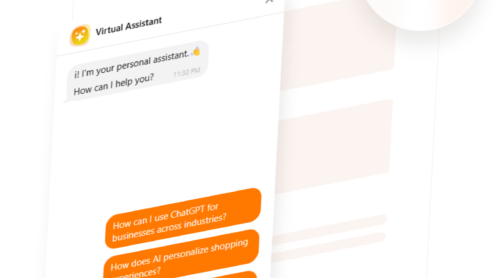AI in sales refers to the use of artificial intelligence technologies — such as machine learning, automation, and predictive analytics — to optimize sales processes, improve customer interactions, and enhance decision-making. By automating tasks like lead qualification and personalized outreach, AI allows sales teams to focus on closing deals and building relationships.
AI-driven tools are transforming sales by improving efficiency, personalizing customer engagement, and enhancing sales forecasting. From AI sales automation reducing manual tasks to AI sales enablement providing real-time insights, businesses using AI in sales gain a competitive edge and increase revenue.
The Rise of AI in Sales: Market Trends & Growth
Artificial intelligence is rapidly transforming sales, helping businesses streamline processes, enhance decision-making, and improve customer engagement. As AI technology advances, its adoption in sales continues to accelerate, driven by significant market trends and projected growth.
AI Adoption in Sales is Accelerating
Companies across industries are heavily investing in AI-driven solutions to optimize their sales operations. According to Fortune Business Insights, the global AI market is expected to grow from $294.16 billion in 2025 to $1.77 trillion by 2032, reflecting a CAGR of 29.2%.
Sales teams leveraging AI are already experiencing significant productivity boosts. A McKinsey report highlights that generative AI alone could increase sales productivity by 3% to 5% of current global sales expenditures.
How AI is Reshaping Sales Teams and Workflows
AI is not just a tool for automation — it is fundamentally reshaping sales roles and workflows. Businesses utilizing AI in their sales processes have reported substantial efficiency gains, including a 50% increase in leads and appointments, as noted by CETDIGIT.
Moreover, AI-driven sales tools are drastically reducing operational costs. AI-powered automation has been found to cut call time by 60-70% while lowering overall sales costs by 40-60%, according to CETDIGIT.
Generative AI is Driving the Next Wave of AI in Sales
Generative AI is rapidly becoming a game-changer in sales, particularly in content creation, lead nurturing, and personalized outreach. AI-powered tools can generate tailored marketing materials, proposals, and sales scripts at scale, significantly enhancing engagement with potential customers.
A recent McKinsey study estimates that generative AI has the potential to contribute up to $4.4 trillion in annual global productivity, with marketing and sales functions capturing a large portion of this value.
The Future of AI in Sales: What’s Next?
As AI continues to evolve, its impact on sales will only grow. By 2025, over 75% of B2B sales interactions are expected to occur through AI-powered digital channels. Innovations such as AI-driven sales coaching, real-time sentiment analysis, and advanced predictive analytics will further enhance sales strategies, allowing businesses to anticipate customer needs with greater precision.
Companies that integrate AI into their sales processes today will be better positioned to increase efficiency, enhance customer engagement, and gain a competitive edge in the evolving marketplace. AI is no longer a luxury for sales teams — it’s becoming a necessity for success.
How to Use AI for Sales: Key Applications
Artificial intelligence is becoming a cornerstone of modern sales strategies. From sales calls to CRM optimization, AI is empowering sales teams to work smarter, close deals faster, and improve overall customer experience. With its ability to analyze vast amounts of data, detect patterns, and make real-time recommendations, AI is transforming traditional sales processes. Here’s how you can leverage AI across different areas of your sales efforts.
📱 AI for Sales Calls & Conversational AI
One of the most significant ways AI is transforming sales is through sales calls and conversational AI. Traditionally, sales teams spent hours making calls, following up, and trying to gauge customer intent. AI is now helping them perform these tasks more effectively with real-time insights and automated support.
How AI Enhances Sales Calls
AI-driven tools for sales calls are designed to improve conversation quality and boost engagement. Here are the main features:
- Real-time Coaching – AI can analyze ongoing conversations and provide live coaching to sales reps. This includes recommending changes to tone, pitch, or approach to better engage with the customer. Sales reps receive immediate feedback, which can improve their performance on the spot.
- Sentiment Analysis – AI can analyze speech patterns and vocal tones to understand the customer’s emotions, helping reps gauge whether a customer is interested, skeptical, or frustrated. By detecting these emotional cues, AI enables salespeople to adapt their strategies for better engagement and relationship building.
- Automated Call Summaries – After a call, AI automatically transcribes conversations, extracts key action items, and updates CRM systems with detailed notes. This ensures that no important detail is overlooked, and follow-ups are always based on the most relevant information.
Example AI Tools for Sales Calls
AI sales tools are already making a significant impact on sales call efficiency. Here are a few top tools that are transforming sales call dynamics:
| Tool | Key Features | Best For | Additional Benefits |
|---|---|---|---|
| Gong | Real-time coaching, call analytics, conversation insights | Improving sales performance through data-driven feedback | Enhances call quality, improves training, and boosts conversions |
| Chorus.ai | Sentiment analysis, engagement tracking, conversation analytics | Identifying prospect intent and optimizing sales strategies | Helps sales teams refine messaging based on emotional cues |
| Dialpad AI | Automated transcription, action item generation, call summaries | Streamlining post-call tasks and CRM integration | Saves time, reduces manual entry, and ensures accurate records |
By using these AI tools, sales teams can reduce wasted time, improve productivity, and ensure that every call is as effective as possible.
🤖 AI Sales Automation & CRM Optimization
Sales automation is one of the biggest advantages AI brings to the table. AI-powered sales automation tools take over repetitive tasks, allowing your sales team to focus on higher-value activities such as building relationships and closing deals. Additionally, AI plays a crucial role in optimizing CRM systems, ensuring that customer data is up-to-date, accessible, and actionable.
How AI Optimizes Sales Automation and CRM
- Lead Nurturing – AI can automate the lead nurturing process by sending personalized follow-up emails and content based on the lead’s behaviors and engagement history. This ensures prospects receive relevant information at the right time, increasing the chances of conversion.
- Data Entry Automation – One of the most time-consuming tasks for sales reps is updating CRM systems. With AI, this process is automated, saving valuable time and reducing errors. AI tools automatically log emails, meetings, calls, and other interactions, keeping the CRM data accurate and up-to-date without manual intervention.
- Predictive Engagement – AI analyzes patterns in a lead’s interaction history and predicts the best time and channel for reaching out. By doing this, it maximizes the effectiveness of outreach efforts, ensuring sales reps reach out when a prospect is most likely to respond.
By automating tasks and optimizing workflows, AI not only boosts productivity but also ensures that sales teams are focusing on the most critical tasks, reducing burnout and increasing efficiency.
🎯 AI for Lead Scoring & Qualification
In the world of sales, not all leads are created equal. Some are ready to purchase immediately, while others need more nurturing. AI helps by automating the process of lead scoring and qualification, allowing sales teams to focus on the highest-value prospects.
How AI Improves Lead Scoring & Qualification
AI analyzes vast amounts of customer data to predict the likelihood of a lead converting into a paying customer. Here’s how it works:
- Predictive Lead Scoring – AI uses historical data, including past customer interactions and behaviors, to create a lead score that reflects the probability of conversion. For instance, a lead who frequently visits the pricing page or responds to emails may receive a higher score, indicating they are ready to buy.
- Behavioral Data Analysis – AI tracks behaviors such as email opens, website visits, social media interactions, and content engagement. These behaviors are used to identify leads who are actively considering a purchase, allowing sales teams to prioritize these leads.
- Automated Lead Prioritization – AI can rank leads automatically based on their probability of conversion, ensuring that sales teams spend more time on high-potential opportunities and less time on leads that are unlikely to convert.
By automating lead qualification, AI ensures that sales reps are always working with the best opportunities, reducing wasted efforts and improving conversion rates.
✍ Generative AI for Sales Content & Outreach
Content creation is another area where AI is making a significant impact. Generative AI is capable of creating personalized sales content — ranging from emails to proposals — at scale, helping sales teams maintain a personalized approach without spending excessive time crafting each message.
How Generative AI Powers Sales Content
- Personalized Emails – Generative AI uses data from a prospect’s previous interactions, interests, and engagement patterns to create highly personalized email outreach. This reduces the time sales teams spend drafting individual emails and ensures each prospect receives content tailored to their needs.
- Proposal & Contract Drafting – AI can automatically generate sales proposals and contracts based on a template and the unique details of each customer. This speeds up the sales cycle, as reps no longer need to manually write every document from scratch.
- Automated Sales Scripts & Chatbot Responses – Generative AI can create scripts for sales reps and responses for chatbots, ensuring consistent and relevant communication across all touchpoints.
| Generative AI Use Case | Impact on Sales | Benefit to Sales Teams |
|---|---|---|
| AI-driven Emails | Increased open and response rates by personalizing content | Saves time while improving engagement with highly tailored outreach |
| Automated Proposals | Reduced sales cycle time by streamlining document creation | Accelerates deal closure and allows for quicker customer follow-ups |
| AI-powered Chatbots | Improved customer experience with instant responses and personalized interactions | Provides 24/7 customer support, qualifying leads faster, and engaging visitors promptly |
By using AI to automate content creation, sales teams can focus on the strategic aspects of the sales process while ensuring their outreach remains highly personalized.
📈 AI-Powered Sales Forecasting & Analytics
Sales forecasting is essential for planning and strategy, but traditional methods can often be imprecise. AI-driven sales forecasting tools provide more accurate predictions by analyzing historical data, market conditions, and other relevant factors.
How AI Improves Sales Forecasting
- Revenue Predictions – AI models analyze trends from previous sales data to predict future revenue and sales outcomes. These predictions allow sales teams to adjust their strategies and resources accordingly, ensuring they’re prepared for potential opportunities or challenges.
- Real-time Insights – AI-powered dashboards offer real-time performance tracking, showing how sales are progressing against targets and allowing for adjustments during the sales cycle.
- Identifying Risks – AI can also detect potential risks, such as deals that are likely to fall through or leads that are becoming less engaged. By identifying these risks early, sales teams can take proactive measures to mitigate them.
AI-driven forecasting enables businesses to make data-driven decisions, optimize their sales processes, and adapt quickly to market shifts.
💻 AI Sales Representatives & Virtual Assistants
AI-powered virtual sales assistants and sales representatives are quickly becoming an essential part of sales teams. These AI tools can handle initial customer inquiries, qualify leads, and schedule meetings, allowing human reps to focus on higher-value activities.
How AI Sales Reps & Virtual Assistants Help
- Engage 24/7 – AI sales reps, such as chatbots and virtual assistants, are available around the clock to handle customer queries, ensuring leads are never left waiting.
- Qualify Leads – AI can ask pre-programmed questions to determine whether a lead is qualified, such as budget, timeframe, or pain points. This initial qualification process ensures only the most promising leads are passed on to human sales reps.
- Automated Scheduling – AI virtual assistants can automatically schedule meetings between prospects and sales reps, syncing with calendars to eliminate scheduling conflicts.
By integrating virtual assistants into the sales process, businesses can respond to inquiries instantly and qualify leads efficiently, ensuring sales reps can focus on building relationships and closing deals.
AI Chatbots: Enhancing Customer Engagement and Lead Qualification
AI-powered chatbots are revolutionizing the way businesses engage with prospects online. These intelligent virtual assistants can seamlessly handle customer queries, qualify leads, and guide prospects through their buying journey 24/7, providing instant support even when human agents are unavailable.
By deploying AI chatbots, sales teams can:
- Qualify Leads Efficiently: AI chatbots can ask pre-programmed questions to determine a lead’s potential, such as budget, product interest, and purchasing timeline.
- Personalize Engagement: Using customer data, chatbots can tailor their responses, offering personalized recommendations and content, which boosts the likelihood of conversion.
- Free Up Human Agents: With routine inquiries handled by the chatbot, human agents can focus on more complex issues and high-value opportunities, increasing overall sales productivity.
Build your smart assistant right now with the easy-to-use editor!
Benefits of Using AI in Sales
AI is not just a trend — it’s a powerful tool that brings tangible benefits to sales teams. AI enables sales professionals to work smarter, not harder. By leveraging AI technologies, businesses can streamline operations, improve decision-making, and gain a competitive edge.
Let’s dive into the key advantages AI brings to the sales process.
Increased Efficiency & Productivity ⚡
One of the most immediate benefits of using AI in sales is the dramatic increase in efficiency and productivity. Sales teams are often bogged down with time-consuming administrative tasks that detract from their primary job: selling. AI addresses this challenge by automating repetitive processes and optimizing workflows.
How AI Sales Enablement Reduces Manual Tasks
- Automated Data Entry – AI tools can automatically log customer interactions, calls, emails, and meeting notes, reducing the need for manual data input. This ensures that sales reps spend less time on administrative work and more time with prospects.
- Streamlined Lead Management – AI-powered systems can automatically track leads through the sales pipeline, update their status, and notify sales reps when to take action. This ensures no lead is forgotten and follow-ups are timely.
- Task Automation – AI helps automate mundane tasks like scheduling meetings, sending follow-up emails, and generating reports, freeing up time for reps to focus on building relationships and closing deals.
By eliminating manual tasks, AI empowers sales teams to focus on what they do best—engaging with leads and closing deals.
Better Personalization & Customer Engagement 👨
In the age of hyper-personalization, delivering the right message at the right time is essential. AI enables sales teams to tailor their interactions based on customer data and behavior, improving engagement and conversion rates.
How AI Customizes Messaging & Engagement Strategies
- Targeted Communication – AI analyzes customer behavior, preferences, and interaction history to craft personalized messages. For example, AI can recommend specific products based on a prospect’s previous browsing activity, creating a more relevant and timely outreach.
- Real-Time Personalization – AI-driven tools can adjust messaging in real time. If a prospect shows interest in a particular feature or service, AI can instantly adapt follow-up communication to address those interests.
- Omni-Channel Engagement – Whether via email, phone calls, or social media, AI ensures that each customer receives consistent, personalized communication across all touchpoints.
By personalizing outreach, AI helps sales reps foster better relationships with customers, creating stronger bonds and increasing the likelihood of closing deals.
Improved Sales Forecasting & Decision-Making 📊
Accurate sales forecasting is critical for setting goals, planning resources, and making informed business decisions. AI enhances this process by analyzing historical data and predicting future trends with greater accuracy.
AI’s Role in Predicting Trends and Guiding Sales Strategies
- Predictive Analytics – AI analyzes vast amounts of historical sales data to predict future trends. It identifies patterns and signals that human analysts may miss, allowing sales leaders to anticipate market shifts, adjust strategies, and make data-driven decisions.
- Revenue Predictions – AI models can provide more accurate revenue forecasts by factoring in variables such as seasonal trends, customer behaviors, and market conditions. This helps sales managers align resources and set realistic targets.
- Lead & Opportunity Scoring – By using AI to evaluate leads and opportunities based on past interactions, businesses can prioritize prospects more effectively, ensuring that sales reps focus their efforts on leads with the highest likelihood of conversion.
With AI, sales teams can make more informed, timely decisions, resulting in smarter strategies and more consistent sales growth.
Competitive Advantage in Sales 🏆
Companies that embrace AI are quickly gaining a competitive edge in the marketplace. Those that continue to rely on traditional methods risk falling behind.
Why Companies Using AI Outperform Traditional Sales Teams
- Faster Response Times – AI enables instant responses to customer inquiries, ensuring that prospects are engaged immediately, even when human agents are unavailable. Faster response times lead to higher conversion rates and improved customer satisfaction.
- Smarter Decision-Making – With AI providing predictive insights, sales teams can make more informed decisions about which leads to pursue, which strategies to implement, and when to adjust their approach.
- Optimized Sales Strategies – AI continuously analyzes performance data and adjusts strategies to optimize results. Companies that use AI are better equipped to spot trends, optimize campaigns, and outperform competitors who are still using manual methods.
By integrating AI into their sales strategies, companies can streamline their operations, improve their customer experiences, and significantly outperform their competitors.
The benefits of using AI in sales are undeniable. From increasing efficiency and productivity to delivering better personalization and making more informed decisions, AI provides invaluable support at every stage of the sales process. Companies that adopt AI-driven tools can stay ahead of the competition, achieve higher conversion rates, and drive greater revenue growth. If you’re looking to take your sales strategy to the next level, AI is the key to unlocking new levels of success.
How to Get Started with AI for Sales
Adopting AI in sales can seem like a big step, but with the right approach, the transition can be smooth and highly beneficial. Implementing AI tools involves careful planning, choosing the right platforms, and ensuring that your sales team is equipped to make the most of these technologies. Below are some key steps to get started with AI for sales.
Assessing Your Sales Needs & AI Readiness
Before diving into AI implementation, it’s essential to evaluate your current sales processes and assess whether your organization is ready for AI adoption. Not every business requires the same AI tools, so understanding where AI can be most beneficial to your sales team is the first step.
- Identify Pain Points: Are there specific areas where your sales team struggles? Perhaps time-consuming administrative tasks or the inability to provide personalized outreach at scale? Pinpointing these areas will help you determine which AI applications will have the most significant impact.
- Evaluate Data Quality: AI tools rely heavily on data, and good data is crucial to driving accurate results. Evaluate the quality and consistency of your sales data. If your data is disorganized or incomplete, it’s a good idea to clean and optimize it before moving forward with AI.
- Team Readiness: AI adoption requires your sales team to be comfortable with new technologies. Assess your team’s tech proficiency and be ready to provide training. If the team is open to innovation and has a growth mindset, AI will be a valuable tool to help them succeed.
By assessing your sales needs and ensuring that your team is prepared for AI adoption, you’ll be in a stronger position to implement AI tools that will yield results.
Choosing the Right AI Sales Tools & Platforms
Once you’ve assessed your sales needs and AI readiness, the next step is choosing the right AI tools for your team. With so many AI platforms available, it’s important to select solutions that align with your goals and integrate well into your existing workflows.
- AI Chatbots: If your team needs to engage prospects immediately on your website, AI chatbots like Elfsight AI Chatbot can streamline customer interactions and qualify leads without human intervention.
- CRM Automation: Tools like HubSpot or Salesforce Einstein integrate AI into your CRM system, helping to automate lead nurturing, follow-ups, and data entry. They offer built-in AI-driven insights for improving customer relationships.
- Sales Analytics & Forecasting: Platforms such as Gong or Chorus.ai can help you analyze sales calls and forecast sales outcomes, providing your team with actionable insights.
- Lead Scoring: Tools like InsideSales use AI to prioritize leads based on past behavior and interaction, ensuring that your team focuses on the highest-value opportunities.
When choosing the right AI tool, be sure to consider ease of integration with your existing systems and your team’s specific needs. Additionally, look for platforms that offer customization options and reliable customer support.
Best Practices for AI Implementation in Sales Teams
Successfully implementing AI in sales requires more than just adopting the right tools; it also involves creating a strategy for seamless integration and adoption within your team. Here are some best practices to keep in mind:
- Set Clear Objectives. Define clear, measurable goals for AI implementation. Whether it’s improving lead conversion rates, streamlining workflows, or providing better customer engagement, having a specific target helps you assess AI’s effectiveness.
- Start Small, Scale Gradually. Begin with one or two AI tools to address specific pain points. Once your team becomes comfortable with these tools, gradually expand their use to other areas of the sales process. This phased approach ensures a smoother transition and less disruption.
- Provide Ongoing Training. AI is a powerful tool, but your team needs to know how to use it effectively. Offer regular training and resources to ensure that everyone is up to speed on how AI can support their role and drive results.
- Monitor & Adjust. AI tools should evolve alongside your sales strategy. Regularly monitor performance, review analytics, and make adjustments to how you use AI tools. This helps you stay agile and ensure that AI remains aligned with your sales goals.
By following these best practices, your sales team will be better equipped to integrate AI seamlessly into their daily operations and maximize its impact.
Measuring AI’s Impact on Sales Performance
Once your sales team is using AI tools, it’s important to track the impact these tools are having on performance. Measuring AI’s effectiveness is essential to ensuring that your investment is paying off and that AI is helping you achieve your sales goals.
- Sales Metrics. Look at key performance indicators (KPIs) such as conversion rates, lead response times, and average deal size. Are these metrics improving since AI was implemented? A positive trend indicates that AI is having a meaningful impact.
- Time Savings. Evaluate how much time your sales reps are saving with AI automation. For example, if AI is automating data entry or follow-up emails, track how much time is freed up for more sales-focused activities.
- Customer Feedback. Monitor customer satisfaction and feedback. If AI chatbots or virtual assistants are being used, collect customer sentiment data to ensure that AI interactions are meeting or exceeding expectations.
- Revenue Growth. Ultimately, the goal of AI in sales is to increase revenue. By comparing sales performance before and after AI adoption, you can measure the direct effect on your bottom line.
Regularly measuring AI’s impact will help you determine whether the tools are driving value and where there might be room for improvement or further optimization.
Starting with AI in sales doesn’t have to be overwhelming. By carefully assessing your sales needs, choosing the right AI tools, and implementing them strategically, you can unlock significant value for your sales team. Remember to monitor your results closely, adapt as needed, and ensure that your team is always equipped to maximize the potential of these powerful technologies. By following these steps, you’ll be well on your way to leveraging AI to improve efficiency, boost engagement, and drive growth.
Conclusion
AI is transforming the sales landscape by automating tasks, enhancing personalization, and improving decision-making. From automating lead qualification to refining sales strategies with predictive analytics, AI empowers sales teams to be more efficient and effective. As AI tools become more integrated into sales processes, companies that embrace these technologies will gain a competitive edge in an increasingly data-driven market.
Looking ahead, the future of AI in sales is promising, with innovations poised to further optimize sales workflows and customer interactions. To stay competitive, sales teams must leverage AI strategically, balancing automation with human touch to create stronger connections with customers. Now is the time to integrate AI tools and unlock new opportunities for growth and success.






